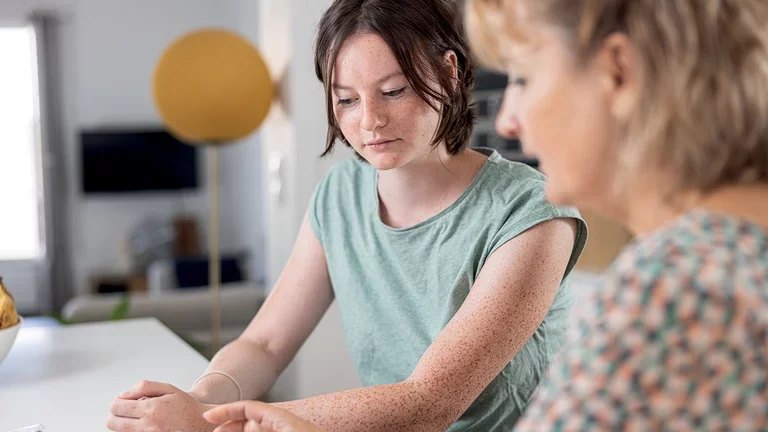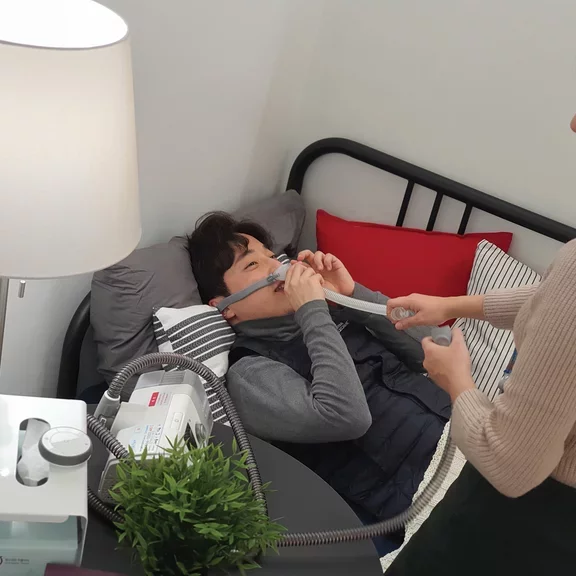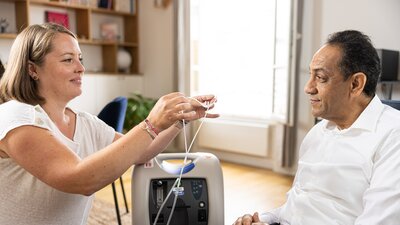In home healthcare, we aim at providing everyday personalized support for people living with chronic diseases, with the objective to make it easier for them to achieve their therapy goals and improve their quality of life. We believe in the combination of the most suitable treatment and the most adapted support, both are key components in supporting chronic diseases. At Air Liquide, we are convinced that we can contribute to better outcomes through a focus on personalization of care.
Listening to patients to implement services that matter to them
“If you take 100 people with Type 1 diabetes, you’re looking at 100 different variations of the disease.” Those are the words of Sofia Segersson, who is a patient community manager working with Air Liquide, and who also lives with the condition herself. She is leading a Patient Advisory Board, a new forum for 54 patients living in Sweden, with ages ranging from 17 to 30, all of whom have Type 1 diabetes. It was initiated by Sofia Segersson and Daniel Stjern, Diabetes Business Development & Innovation Manager at Air Liquide, following a common vision to incorporate a deep understanding of patients’ needs into the development of Air Liquide’s diabetes services.
In recent years, technology has made giant strides in helping to manage the condition with more advanced connected devices. Such technologies, together with the appropriate training and support, help improve patients’ clinical results and outcomes. While this is good news and often liberating for them, an aspect may be going largely untreated: their emotional wellbeing. Sofia Segersson comments: "A patient may meet a physician perhaps once or twice a year. But what we need is not just ‘how are you?’ but more ‘how are you, really?’ This need can be particularly acute when a young adult leaves paediatric care and, possibly, the daily support of parents. To transition from child to adult in the healthcare system can be a lonely experience.”
Listening, then acting to empower
Our Patient Advisory Boards give the time and space to delve into how patients actually are, and to talk beyond their clinical data related to glucose rate for instance. They can explore what their pain points are and together suggest a solution to fix them based on experiences, expectations, disease expertise and data because it is created jointly by both data outputs and expert humans. Sofia Segersson concludes: “It is really important that the patient’s voice is being properly listened to. As patients, we are the experts!”
Sofia Segersson
Patient Community Manager, an Air Liquide partner
Enhancing personalization care plans in South Korea
In Air Liquide Healthcare, our objective to transform our model of care toward value materialises in the implementation of personalized care plan offers. Our basic personalized care plan offer is driven by the data coming from the medical device we install at patient’s home to support their treatment. However, our target is to move beyond, by personalizing the care plans based on the monitoring of outcomes (clinical outcomes and/or outcomes that matter to patients). In this instance, if the monitoring of outcomes does not show the results expected, an action is taken to remedy the situation, such as additional interactions with the patient through phone, visit or message, additional educational support or technical support and coordination with the prescriber.
120
initiatives focused on patients since 2021
The patients’ outcomes are collected by surveys or through a mobile app: in that case, it allows patients to give more precise feedback at any time. They are actively involved in discussing outcomes that matter most to them, which places them at the centre of their care.
A key example of the personalization of care through outcomes measurement is South Korea. This entity has been actively deploying personalized care plans in 2023. The proportion of patients with sleep apnea adhering to the outcome-centric personalized level rose from 0 to 37% between 2022 and 2023. Thanks to that, we expect a better rate of patient empowerment, a better compliance to treatment and in particular at the initiation of the treatment.
A successful care plan, closely adhered to by the patient, aims to enhance the chances of success of the therapy – and that the patient may be less likely to develop comorbidities associated with sleep apnea disease. This has benefits for the patient, the physician and the healthcare system.





